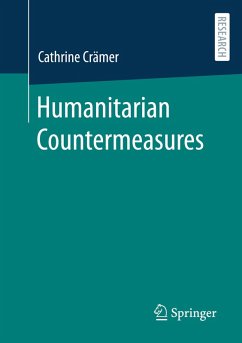"[I]f humanitarian intervention is, indeed, an unacceptable assault on sovereignty, how should we respond to a Rwanda, to a Srebrenica-to gross and systematic violations of human rights that offend every precept of our common humanity?" - Kofi Annan
This question asked by Kofi Annan over twenty years ago has not lost its relevance since, as for instance demonstrated by the paralysis of the Security Council in the face of the continued use of chemical weapons by the Syrian regime against its own population.
The present work addresses the question of whether the unilateral use of force by states for humanitarian purposes, hence without a Security Council authorization, could be justified via the concept of 'humanitarian countermeasures'. In this context, humanitarian countermeasures are derived from the notion of countermeasures, which stems from the law of state responsibility as conceived in Art. 49 et seq. DARS and traditionally only refers to peaceful, bilateral measures. The core of the study is to open up countermeasures to humanitarian military action, discuss the legal feasibility of such an approach, while effectively containing the potential for abuse by establishing a legal framework. In a final step, concrete conditions for humanitarian countermeasures are defined, which can guide a reinterpretation of countermeasures and the further development of customary law.
About the author
Cathrine Crämer studied law at the Humboldt European Law School at the HU Berlin, the Université Paris II Panthéon Assas (Maîtrise en Droit in Private International Law) and at King's College London (LL.M. in Transnational Law). She obtained her doctorate at the LMU Munich, where she worked as a research assistant and taught public international law. Cathrine Crämer is currently a legal trainee at the Permanent Mission of Germany to the United Nations in New York.
This question asked by Kofi Annan over twenty years ago has not lost its relevance since, as for instance demonstrated by the paralysis of the Security Council in the face of the continued use of chemical weapons by the Syrian regime against its own population.
The present work addresses the question of whether the unilateral use of force by states for humanitarian purposes, hence without a Security Council authorization, could be justified via the concept of 'humanitarian countermeasures'. In this context, humanitarian countermeasures are derived from the notion of countermeasures, which stems from the law of state responsibility as conceived in Art. 49 et seq. DARS and traditionally only refers to peaceful, bilateral measures. The core of the study is to open up countermeasures to humanitarian military action, discuss the legal feasibility of such an approach, while effectively containing the potential for abuse by establishing a legal framework. In a final step, concrete conditions for humanitarian countermeasures are defined, which can guide a reinterpretation of countermeasures and the further development of customary law.
About the author
Cathrine Crämer studied law at the Humboldt European Law School at the HU Berlin, the Université Paris II Panthéon Assas (Maîtrise en Droit in Private International Law) and at King's College London (LL.M. in Transnational Law). She obtained her doctorate at the LMU Munich, where she worked as a research assistant and taught public international law. Cathrine Crämer is currently a legal trainee at the Permanent Mission of Germany to the United Nations in New York.








